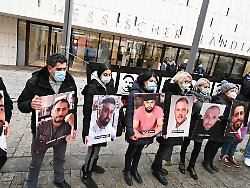Friday, December 03, 2021
Have “cried and cried”
Hanau members shake up committee
It has been almost two years since nine people died in a racially motivated attack in Hanau. The bereaved relate their memories in front of the Hessian state parliament. Their stories have one thing in common: the feeling of being left alone.
When the brother of one of the victims of the Hanau attack finishes his report, it is very quiet for several minutes in the room where the investigative committee of the Hessian state parliament meets. Hayrettin Saraçoglu previously described in detail as a witness how tissue samples from his dead brother Fatih were given to him after the racist act on February 19, 2020.
After the autopsy, they stayed behind in the Frankfurt forensic medicine department. He personally brought these remains to Turkey to be buried there. He really felt very lonely in this situation, says Saraçoglu, whose statements are translated by an interpreter.
A 43-year-old German murdered nine people for racist motives in Hanau on February 19, 2020, presumably afterwards he shot his mother and himself. Saraçoglu is one of three survivors the committee hears as witnesses at the start of its public meetings. He found out about his brother’s death from his landlady, he said. He received support from a lawyer and sought psychological help on his own.
Waiting would have “cried and cried”
“I would have liked someone from the authorities to point the way and inform us,” explains Saraçoglu. “As a result of the attack, I not only lost my beloved brother, my entire existence has been destroyed.” It is good that the relatives can now speak publicly in front of the committee. It is about a problem that affects all of Germany. “The source of the problem is racism.”
The cousin of the victim of the attack, Kaloyan Velkov, previously described via an interpreter that she was largely on her own after the crime. The police only discovered her cousin, who was like a brother to her, about 25 to 30 minutes after arriving at the scene, according to Vaska Zladeva.
The relatives were left to wait for hours in front of the building and later in a hall without giving them any information or looking after them personally. The waiting relatives “cried and cried”. It was only around 6:30 a.m. that the names of the victims of the attack were read from a list. She and his mother were not allowed to see his body until five to six days later and after a DNA comparison – even though he had an identity card, health insurance and bank card with him.
“Had to go through there alone”
It was only then that they were offered psychological help, but after they had held out for five or six days, she declined. “We had to go through it alone.” The autopsy was carried out without her consent. She herself felt guilty that she had once suggested to her cousin to come to Germany, she thought it was a good country, said Zladeva.
The chairwoman of the SPD in the investigative committee, Heike Hofmann, speaks of moving testimonies that have shaken up and shown how deeply trust in the state and its institutions has been shaken among those who have to mourn the victims of the attack to this day. CDU chairman Jörg Michael Müller emphasizes that it is right to give the relatives a space to give their view of this act. Hesse’s Prime Minister Volker Bouffier, Interior Minister Peter Beuth, both from the CDU, and the entire black-green government coalition have promised to carry out the investigation comprehensively.
For FDP chairman Jörg-Uwe Hahn, the surveys show that the relatives were not cared for in a targeted manner. There was no indication of the possibility of receiving psychological support and consulting a lawyer. With a vigil in front of the Hessian state parliament that morning, the “February 19th Hanau Initiative” drew attention to the concerns of the bereaved. The initiative’s spokesman, Hagen Kopp, said: “The vigil stands for complete clarification and consequences.”
